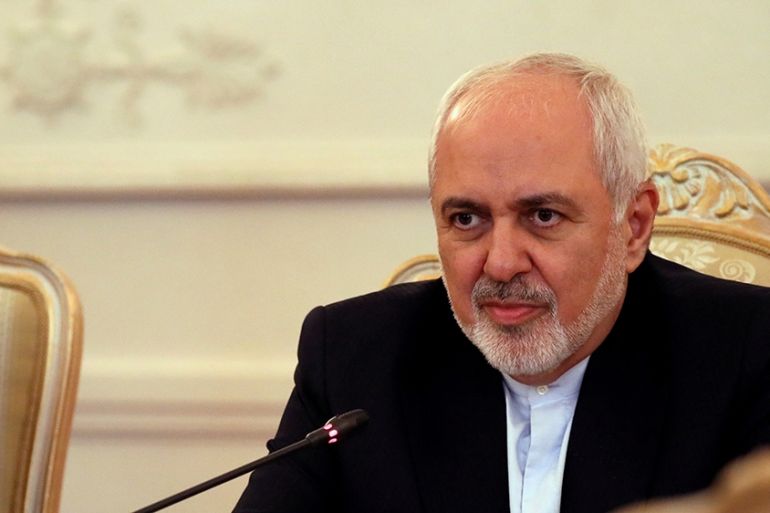US imposes sanctions on Iranian Foreign Minister Zarif
Iran’s top diplomat brushes off latest move in Washington’s ‘maximum pressure’ campaign, says action has ‘no effect’.

The United States has imposed sanctions on Iranian Foreign Minister Mohammad Javad Zarif, the latest move by Washington in its “maximum pressure” campaign against Tehran.
The Treasury Department said on Wednesday that it was imposing sanctions on Zarif for acting on behalf of Iranian Supreme Leader Ayatollah Ali Khamenei.
Keep reading
list of 4 itemsTrump faces Supreme Court immunity test as ‘hush money’ trial continues
Five takeaways from day two of Trump’s New York hush money trial testimony
‘Catch and kill’ scheme takes centre stage at Trump hush-money trial
“Javad Zarif implements the reckless agenda of Iran’s Supreme Leader, and is the regime’s primary spokesperson around the world,” Treasury Secretary Steven Mnuchin said in a statement.
Zarif brushed off the sanctions on Twitter, saying the US move indicated Washington saw him as a “threat”.
“It has no effect on me or my family, as I have no property or interest outside of Iran,” he said.
The US' reason for designating me is that I am Iran's "primary spokesperson around the world"
Is the truth really that painful?
It has no effect on me or my family, as I have no property or interests outside of Iran.
Thank you for considering me such a huge threat to your agenda.— Javad Zarif (@JZarif) July 31, 2019
Tensions have escalated between the two countries since US President Donald Trump last year unilaterally withdrew Washington from a landmark nuclear deal signed between Iran and world powers in 2015. Since then, it has reimposed punishing sanctions on Iran, including measures aimed at slashing its oil exports to zero, as part of a campaign aimed at pressuring Tehran to negotiate a new nuclear deal.
Fears of a direct US-Iranian conflict have risen since May with several suspected attacks on oil tankers in the Gulf, Iran’s downing of a US surveillance drone, and a plan for US air raids on Iran last month that Trump called off at the last minute.
‘Peak of stupidity’
The highly unusual action of penalising the top diplomat of another country comes a month after Trump signed an executive order placing sanctions on Iran’s Supreme Leader, Ayatollah Ali Khamenei. At the time, the US had said it was also considering sanctions against Zarif.
The Trump administration said it would make decisions on whether to grant Zarif a travel visa, including for trips to the United Nations, on a case by case basis, holding open the possibility that he might attend the annual UN General Assembly in September. Zarif last visited the UN in New York last month, but his movement was restricted to a small area near the world body’s headquarters.
In Tehran, Abbas Mousavi, foreign ministry spokesman, reacted angrily at the sanctions targeting Zarif.
“The peak of stupidity and inconsistency of America’s leaders is at a point where they don’t recognise Dr Zarif as being influential in Iran‘s policy but with the ultimate ignorance they sanction him! The Americans have a strong fear of the logic of Dr Zarif and his negotiating skills,” Mousavi wrote on social media.
Al Jazeera’s Dorsa Jabbari, reporting from Tehran, said that the latest move was seen in Iran as a reflection of the US’s inability to understand “how the Iranian system works”.
“The idea that by sanctioning the foreign minister, that they will get to deal with a more powerful person in the system to talk to is really absurd,” she said.
A senior US official reiterated that Trump was open to talks with Iran, but said the administration did not consider Zarif to be a key decision-maker.
The announcement of the sanctions against Zarif comes as the US, in a mixed message to Tehran, extended for another 90 days waivers allowing foreign firms to work at Iranian nuclear facilities without penalties.
The US State Department said the waiver extension would help preserve oversight of Iran’s civilian nuclear programme.
Iran may cut commitments
On Wednesday, Zarif said that Iran may cut its commitments under the nuclear deal further unless European partners move to protect it from US sanctions by ensuring it can sell oil and receive income.
Zarif also said Tehran was ready to negotiate with regional rival Saudi Arabia. He added, however, that US Secretary of State Mike Pompeo was not welcome in Iran.
“You don’t need to come to Iran,” Zarif told reporters, addressing Pompeo, describing the US secretary of state’s offer to visit Tehran and address the Iranian people a “hypocritical gesture”.
On Monday, Pompeo tweeted: “We aren’t afraid of [Zarif] coming to America where he enjoys the right to speak freely. Are the facts of the [Khamenei] regime so bad he cannot let me do the same thing in Tehran?” he said, referring to Supreme Leader Ali Hosseini Khamenei.
“What if his people heard the truth, unfiltered, unabridged?”
Meanwhile, in an interview with Al Jazeera, Trita Parsi, executive vice president of the Quincy Institute, a US think-tank, said that the decision to sanction Zarif made it “much, much more difficult” for the Trump administration to talk to Iran.
“I think it is quite erroneous to still discuss the intensions of the Trump administration as aimed at securing diplomacy. If you sanction the top diplomat of the other side, you are signalling that you are not looking for diplomacy.”
“If the US and Iran cannot talk, that increases the likelihood of military confrontation, which is the explicit desire of John Bolton, the national security adviser,” Parsi said, referring to the US national security adviser, an arden Iran hawk.
He said the US notion that “maximum pressure” would force Iran to cave in “has been disproven over and over again.”
“If there is anything that would get the Iranians to elicit flexibility, it would be flexibility shown by the American side. That’s what got the Iran nuclear deal in the first time.”